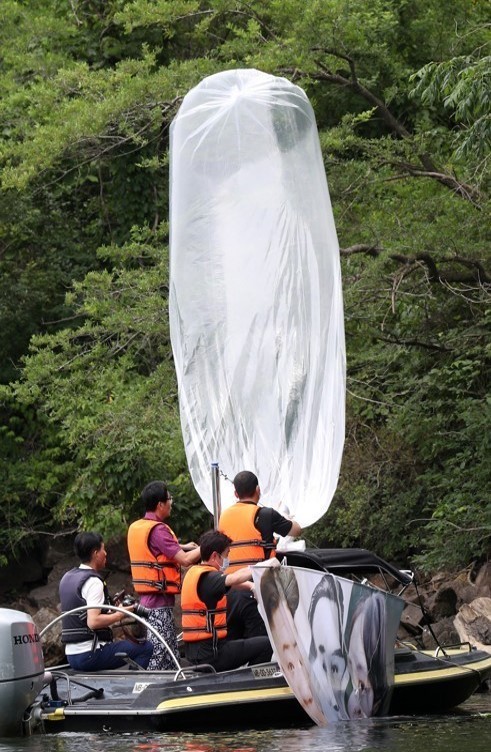Unification ministry distributes fact sheet about leafleting ban to diplomatic corps: official
By YonhapPublished : Dec. 22, 2020 - 15:03

The unification ministry has put together an English-language fact sheet about a recently legislated ban on sending anti-Pyongyang leaflets into North Korea and distributed it to foreign diplomatic missions here, an official said Tuesday.
The fact sheet was sent to the missions of over 50 countries, including member countries of the "Peace Club," a consultative channel between Seoul's foreign ministry and envoys from countries that have diplomatic missions in the North.
Other countries include members of the "Korean Peninsula Club," another channel with foreign diplomatic missions stationed in the South that are also accredited to North Korea, the official said.
In the fact sheet, the ministry explained that freedom of expression can be subject to certain restrictions when necessary for the safety and lives of residents living in the border areas, citing the possibility of provocations from the North.
It added that while freedom of expression is a constitutional right, it cannot take precedence over the right to life and safety of residents living near the Demilitarized Zone (DMZ).
The ministry also stressed the law does not apply to cases in which leaflets or other items are sent to the North from a third country. In such cases, the third country's law will be applied.
"The ministry will seek a broader understanding of the bill by strengthening communication with the international community," another official said.
The ministry's move came after the ruling Democratic Party rammed the leafleting ban through the National Assembly last week, forcefully ending a filibuster by the main opposition party objecting to the bill, despite concerns that the ban undermines the right to freedom of expression.
Many critics, including some US lawmakers and international human rights groups, have expressed concerns about the bill, pointing out it could hurt the freedom of expression and undercut efforts to send outside information into the reclusive North.
Shortly after the bill was approved by the Cabinet earlier in the day, Unification Minister Lee In-young said he will strive to prevent "unnecessary misunderstanding" on the amendments and seek understanding by strengthening communication with the public in close consultation with the National Assembly.
Once enacted, the revision to the law on inter-Korean relations will prohibit the launch of anti-Pyongyang leaflets across the border, with violators subject to a maximum prison term of three years or a fine of 30 million won ($27,400). (Yonhap)
The fact sheet was sent to the missions of over 50 countries, including member countries of the "Peace Club," a consultative channel between Seoul's foreign ministry and envoys from countries that have diplomatic missions in the North.
Other countries include members of the "Korean Peninsula Club," another channel with foreign diplomatic missions stationed in the South that are also accredited to North Korea, the official said.
In the fact sheet, the ministry explained that freedom of expression can be subject to certain restrictions when necessary for the safety and lives of residents living in the border areas, citing the possibility of provocations from the North.
It added that while freedom of expression is a constitutional right, it cannot take precedence over the right to life and safety of residents living near the Demilitarized Zone (DMZ).
The ministry also stressed the law does not apply to cases in which leaflets or other items are sent to the North from a third country. In such cases, the third country's law will be applied.
"The ministry will seek a broader understanding of the bill by strengthening communication with the international community," another official said.
The ministry's move came after the ruling Democratic Party rammed the leafleting ban through the National Assembly last week, forcefully ending a filibuster by the main opposition party objecting to the bill, despite concerns that the ban undermines the right to freedom of expression.
Many critics, including some US lawmakers and international human rights groups, have expressed concerns about the bill, pointing out it could hurt the freedom of expression and undercut efforts to send outside information into the reclusive North.
Shortly after the bill was approved by the Cabinet earlier in the day, Unification Minister Lee In-young said he will strive to prevent "unnecessary misunderstanding" on the amendments and seek understanding by strengthening communication with the public in close consultation with the National Assembly.
Once enacted, the revision to the law on inter-Korean relations will prohibit the launch of anti-Pyongyang leaflets across the border, with violators subject to a maximum prison term of three years or a fine of 30 million won ($27,400). (Yonhap)








![[KH Explains] No more 'Michael' at Kakao Games](http://res.heraldm.com/phpwas/restmb_idxmake.php?idx=644&simg=/content/image/2024/04/28/20240428050183_0.jpg&u=20240428180321)



![[Weekender] How DDP emerged as an icon of Seoul](http://res.heraldm.com/phpwas/restmb_idxmake.php?idx=644&simg=/content/image/2024/04/25/20240425050915_0.jpg&u=)






![[Herald Interview] Mistakes turn into blessings in street performance, director says](http://res.heraldm.com/phpwas/restmb_idxmake.php?idx=652&simg=/content/image/2024/04/28/20240428050150_0.jpg&u=20240428174656)
